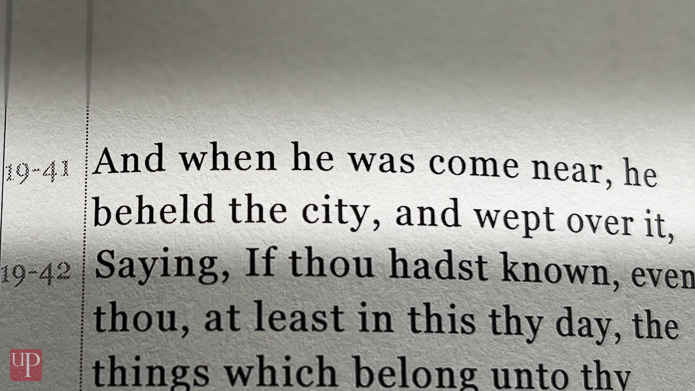If you’re familiar with the gospels you’ll know that there were only a few times where Jesus openly wept.
One of those times was Palm Sunday. Everyone I’ve shared this with says “I don’t understand; What do you mean?” This was the triumphant entrance of Jesus into Jerusalem. Big crowds - Palm branches - Garments laid out before him. Everybody shouting “Hosannah! Hosannah!”
The insight comes when reading all four accounts at once. In this scene (sc.154) all the gospels tell of Palm Sunday, but no single account has the whole story. In fact it’s not until the very next scene (sc.155) and only in Luke (ch.19v.41-44) where this is chronicled. Nonetheless an account of powerful significance (my perspective.)
To fully appreciate this you need to start a few scenes earlier, when Jesus was en route to Jerusalem and he knows it’s the endgame. Word comes to him that Lazarus, brother of Martha and Mary is dying. Jesus purposefully waits two days, so that by the time he reaches them, Lazarus will have already been dead four days. Now bear in mind that they live in Bethany, which is outside of Jerusalem; think city/suburb. Because of this, many Jews from the city were there in Bethany, mourning the death of Lazarus. As a result when Lazarus is risen from the dead, it generates an enormous buzz, which is greatly amplified by all the extra people who have traveled to the region for the Passover celebration. This in turn brings out an even greater number of people from Jerusalem and the surrounding areas to see Jesus and Lazarus for themselves.
(no smart phones or viral videos at the time…)
Subsequently, when Jesus starts to head into the city, these immense crowds quickly gather along the way to see him. At this point in the timeline the vast majority of Hebrews are thinking “this is it!” So the crowds are yelling and shouting “Hosannah,” (Judaic expression of adoration) “Blessed is the King that comes in the name of the Lord.” (Matthew, Mark & Luke) And in John’s account he wrote specifically that they were shouting, “Blessed is the King of Israel that comes in the name of the Lord.” This of course is high-treason, compounded by the possibility of insurrection. The Jewish Rulers know the Romans would not hesitate to invoke a mass killing of Hebrews (possibly including them) to put down any uprising. Not to mention, a shift in power at this level would certainly threaten them.
All this combines into a great deal of excitement and a grand entrance indeed. Yet, consider most Hebrews at this time were already anxiously looking for the Messiah, which they believed would have the power of God to be their king. But more importantly, use that power to deliver them out from under Roman occupation and Roman taxes - So the crowds are thinking; "he raised the dead”—“this is the power of God”—“he will free us from the Romans!"
Not exactly what Jesus has in mind…
So at the zenith of all this tumult, Jesus arrives at Jerusalem. In Scene 155 - Luke 19:41-44 (KJV) it’s written,
And when he was come near, he beheld the city, and wept over it, saying, If thou hadst known, even thou, at least in this thy day, the things which belong unto thy peace! but now they are hid from thine eyes. For the days shall come upon thee, that thine enemies shall cast a trench about thee, and compass thee round, and keep thee in on every side, and shall lay thee even with the ground, and thy children within thee; and they shall not leave in thee one stone upon another; because thou knewest not the time of thy visitation.
Not exactly what the Hebrews had in mind.
The Hebrews believed one thing;
the Jewish Religious Rulers believed another;
the Disciples something else completely;
the Romans thought altogether differently
and then there was Jesus; who wept…
The Romans were naturally superior, being empowered by their governance and armies. The Jewish Rulers were fearful and angry; being threatened by Rome on one side and the disturbing possibilities of Jesus on the other. The Hebrew people who were exhilarated by the prospect of the Messiah actually returning and the power of God in a new king, along with the liberation this would bring. The disciples were likely imagining what places they would each have (ref.sc.110/Luke 09-46) in this new kingdom.
And when Jesus arrives at Jerusalem — he wept.
The very last part of this sequence (sc.155/Jesus Weeps for Jerusalem) in Mark 11:11 (KJV) it’s written;
And Jesus entered into Jerusalem, and into the temple: and when he had looked round about upon all things, and now the eventide was come, he went out unto Bethany with the twelve.
Rather anticlimactic after everything proceeding…
In the end it seems the old adage rings true;
Things are not always as they appear (to us anyway.)
My sincere appreciation as always for the support of my family, friends and associates in helping me publicize this work. To learn more about the Gospel COMPARATIVE book and how it enables anyone to read all the gospels simultaneously go to:
www.gospelcomparative.org/
Many Thanks and More to Come -
